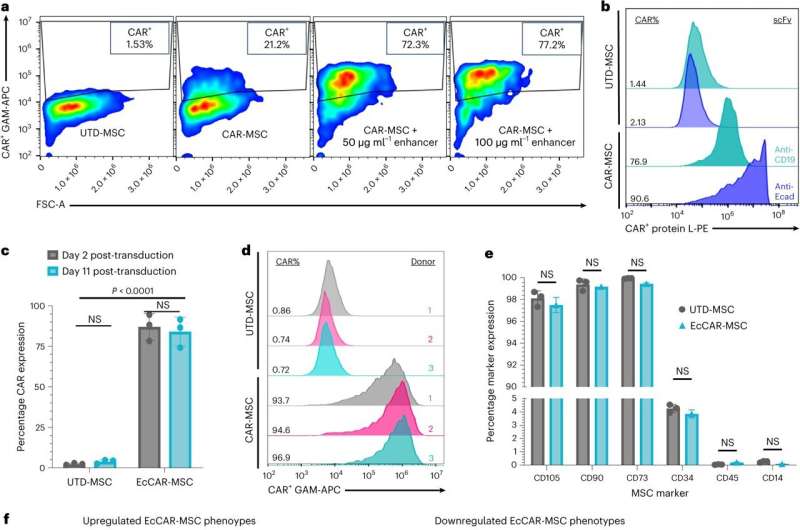This article has been reviewed according to Science X's editorial process and policies. Editors have highlighted the following attributes while ensuring the content's credibility:
fact-checked
peer-reviewed publication
trusted source
proofread
Scientists pioneer immunotherapy technique for autoimmune diseases

Mayo Clinic scientists have developed an immunotherapy strategy that potentially lays the groundwork for treating a spectrum of autoimmune diseases.
The new technique, detailed in a preclinical study published in Nature Biomedical Engineering, involves combining chimeric antigen receptors (CAR) with mesenchymal stromal cells (MSC), resulting in engineered stem cells known as CAR-MSCs.
"The pioneering approach shows potential in targeting inflammatory disease sites more precisely and improving immunosuppression and healing outcomes," says Saad Kenderian, M.B., Ch.B., a principal investigator and hematologist at Mayo Clinic. "We're planning to study interventions that minimize the need for long-term medications for autoimmune diseases."
The combination approach centers on mesenchymal stromal cells, which are found in various tissues in the body, including bone marrow, fat tissue and umbilical cord blood. These cells have the unique ability to transform into several specific types of cells such as bone cells, cartilage cells and fat cells.
Mesenchymal stromal cells are known for calming down the immune system, controlling inflammation and promoting immune tolerance to prevent the body's own tissues from being attacked.
Within this CAR-MSCs framework, mesenchymal stromal cells are engineered with chimeric antigen receptors, which are molecular tools engineered to recognize specific disease-related markers.
Chimeric antigen receptors have three crucial functions: 1) target and attach to specific markers on diseased cells; 2) act as an anchor to ensure the chimeric antigen receptors stay connected to the target; 3) initiate signaling to activate a robust immune response.
While mesenchymal stromal cells have been extensively studied in isolation in autoimmune contexts, their efficacy has fallen short. The combined CAR-MSC therapeutic strategy tackles two key challenges: Mesenchymal stromal cells by themselves have difficulty calming down the strong immune reactions in autoimmune conditions, and they struggle to travel to and attach to the areas of inflammation.
Engineering mesenchymal stromal cells with chimeric antigen receptors shows potential in enhancing their ability to target specific cells or markers and improve their therapeutic impact.
How CAR-MSCs target inflammation
For the study, Dr. Kenderian and his team developed CAR-MSCs to specifically target a protein linked to a condition called graft-versus-host disease, as well as inflammatory bowel diseases, such as ulcerative colitis and Crohn's disease.
Graft-versus-host disease occurs when cells from a donor attack the tissues of the person receiving them, typically following a bone marrow or stem cell transplant.
In mouse models, upon stimulation by the specific protein they were designed to target, CAR-MSCs showed improved ability to go to the inflamed area, have better control of inflammation and improve outcomes and survival. This was mediated by a change in the genetic signature of CAR-MSCs, the proteins they released and receptor expression.
Dr. Kenderian emphasizes that these preliminary findings set the stage for future applications of this technology, paving the way to enhance the therapy's versatility to address various diseases across the autoimmune spectrum.
This study builds upon a series of previously published studies on CAR-T therapy led by Dr. Kenderian and his collaborators at Mayo Clinic's Center for Individualized Medicine, Center for Regenerative Biotherapeutics and the Mayo Clinic Comprehensive Cancer Center. Dr. Kenderian is also investigating ways to make CAR-T cell therapy more accessible to patients through on-site biomanufacturing at Mayo Clinic's campuses in Rochester, Minnesota and Jacksonville, Florida.
More information: Olivia Sirpilla et al, Mesenchymal stromal cells with chimaeric antigen receptors for enhanced immunosuppression, Nature Biomedical Engineering (2024). DOI: 10.1038/s41551-024-01195-6



















